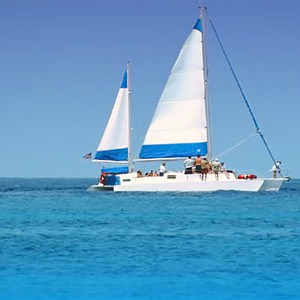Please Register / Login to take part in discussions about the Virgin Islands.
A Q related to air travel.....perhaps pilots can answer....or someone else who knows.
When we travel long distances, I've noticed this:
On the final 1/4 of the flight, the airplane feels like it is speeding up. The engines seem to gun really high. It feels like we are going 1000 mph.
I used to think we were making up time....trying to arrive on time....going extra fast. Now, I think it might be related to the need to dump fuel before we land...so we aren't too heavy to land. So, maybe we're burning off fuel with the jets.
Does anyone know? I feel this on every flight to the VI. What is it that is going on? It lasts about 20 - 30 minutes....and the flight feels really different while it is happening. Nobody around me seems to notice.
I'm determined to find the answer. Thanks to anyone who can help!
Blu,
I've had the sensation of different air speeds as well. I have no idea, but figure we're descending that last half hour or so. Things accelerate on a descent, no? You might try asking the question over at flyertalk.com, a site all about air travel. Those folks seem to live in the sky. If you do get an answer somewhere else, please come back and post it, as I'd love to know about it.
Does anyone else ever feel them step (not slam) on the brakes midflight?
Gerie
Gerie, I will ask on the flight forum - thank you. I'm just so lazy about creating yet another name and password for a forum I'll never use again.
Worth it to know!
I don't think this is during descent, as I can ususally feel descent when it begins. This is before intital descent. I look around and everyone is happily munching on their snacks, sleeping, etc. It used to bother me, but now I recognize it as a part of the normal course of events.
I don't think I've felt a sudden slowing down - not until we start the descent. Is that what you feel?
Blu,
Jeff's best friend is a pilot and he is home right now, will try to remember to ask him!
You come up with some interesting questions girl!
Blu, my ex-husband is a pilot, I'll ask him. Of course, he'll probably lie. We can compare his story with what Sherri's friend says.
I was also a flight attendant for too many years, I have never noticed what you are talking about. But my uneducated guess would be that burning fuel is not the reason. Jet fuel is muy expensive, they have all sorts of fancy gadgets, widgets, computer tubes, calculators, and vodoo to figure out how much fuel is needed without adding too much extra (but enough to circle for a bit or divert to somewhere prettier).
hey bluwater--if you do get an answer from another post make sure you post your answer.
According to "Sky King", it's one of two things. Either they are climbing up to a higher altitude for fuel economy, or they have been handed off to a control center that has told them to speed up. (As you travel along there are different flight control centers that handle a designated area, they tell you to if they want you to climb, hold, speed up, slow down, keep on keepin' on, etc...) Would you like for me to be more vague?
Blu - I'm no pilot either, but I have noticed this on every flight I take. Whenever I hear it, I notice it's immediately when they start to tilt the wings (actually the flaps on the wings) at an angle to start the descent. The net force (and sound from the drag) created from the angle of the wings only makes it sound as though they are accelerating. That, and if they need to turn one way or another, they would need to accelerate to do that.
We need a pilot!!
I asked my son, who is a pilot, and he said that when an aircraft starts to descend (we're talking about a large aircraft) the engine's are actually set to idle. You are essentially then a really big glider. He said that big planes do not like to slow down (that inertia thing) and if the engines are throttled up, the plane will have too much airspeed...and that's a bad thing. You don't want the wings to fall off...that's a really bad thing. Being the engines are now at idle and the angle of the wings have changed, you get the sensation of speeding up. If you notice that when a turn is made on descent, the engines are throttled up to maintain airspeed and back to idle after the turn. When the plane is on its final approach, the throttle is applied to maintain airpseed. Also, he said that aircraft only have about an hour's worth of extra fuel and they don't burn off any fuel...too expensive. The only reason to dump fuel is if there is an emergency right after takeoff and the plane is too heavy to land.
Ron's post reminded me about something that will warm your hearts when you fly over water. The two-engine planes that fly to Europe from the US or any other extended flight over water are designated as ETOPS. This means "Extended Twin Operations" . Or as it's refered to behind closed doors "Engines Turn Or People Swim".
Sorry. 😉
Bluwater
I sent you a PM on Friday regarding Ladies Week, it is still showing as unread! Just trying to confirm Ladies week and get your email.
Betty
I've never noticed, but then I'm either a tiny bit sloshed or pretty decently medicated, because I'm deathly afraid of flying. 😉
I do always notice the noises the planes make, and that scares the holy howard out of me! LOL I do feel the drops sometimes, and that scares me as well. When we were flying back from STT last year, we hit a storm and were dropping and moving around from the turbulance. I started having a freak out, and I semi-stood up and looked around to see if anyone else was freaking out. I was sure they should have been, because I was certain the plane was going to fall apart and crash into the water. LOL
Gari-Ann,
If you really want a wild ride, try flying Cape Air from STT to SJU at 4:00 in the afternoon during the summer. The thermals really make the plane "rock an roll". At one point, we were flying sideways. And then to make it really exciting, the pilot did a short field approach and landing to get out of the way of an incoming airliner!! I'm glad my son has his pilots license...he got to sit in the co-pilot's seat and helped keep me calm!! 🙂
Ack! I think that would have done me in Ron!
Called my friend and this is his answer: He says when they start out they can only go so high due to the weight of the fuel, once they have traveled a way, using that fuel, they are now lighter. They then accelerate (with permission) to a higher altitude with allows them to actually SAVE on fuel (provided there is no head wind). Being that he flies in and out of STT as he lives here, this is what they are doing! Hope this helps! 🙂 Blu, you are talking about before the actual decent right?
Richmond...you are crackin' me up !! As soon as as I saw the "Sky King " reference I said to myself, " I bet I've I sat on the jumpseat next to this smarta$$ !...Sounds like we may have worked in the same "salt mine"...I too was a Sky Goddess" for way tooooooooo long.. PAI/USAir.....If this sounds familiar pm me...and yes folks I ditto what Richmond said re: cost of jet fuel...that stuff is liquid gold....The king's themselves program the flight plan into the onboard computer before they even shut the door....for the most fuel efficient ride...the computer makes adjustments inflight for head winds, etc...Sounds like "Sky King" didn't lie too much, ...this time!
Boats
Now, see, y'all are going to make me really pay attention to this on the next flight. Yes, I think it is BEFORE descent...or, at least before they announce initial descent.
It just feels like we are suddenly flooring it.
I was on the pilot's forum and I signed up, but I have to wait now for permission to post. 🙁
Thanks Sherri. Thanks Donna, Rickmond, Landlocked, Gari-Ann, Ron, Geri and BoatsBeUs.
Now we have different answers. "And the survey says........"
Well, you are correct, they are FLOORING it... A heavy jet climbing to a higher altitude is the same as you driving your heavy SUV up a steep hill. If you do not step on the accelerator (floor it!) you will begin to slow down, and eventually go backwards. The only difference with the heavy jet is when it slows to a point, the wing will stall, and the airplane will fall out of the sky. Therefore, to keep speed up in the climb, the pilot "floors it". 40% of an airline's operating costs are fuel related. Therefore, all pilots try to save as much fuel as possible, every flight. (provided they are not in contract negotiations.) Saving 100 gallons a flight, times 4 flights a day, times 400 airplanes, times 2.25$ a gallon- you do the math. Aerodynamics in a nutshell, the higher an airplane climbs, the thinner the air is. The thinner the air, the less "induced drag" on the airplane, thereby requiring less thrust from the engines, which translates into less fuel. Assuming there is no headwind penalty (ie the pilots knows from his weather reports he is not climbing into a 100 kt headwind) all pilots will "floor it" and climb, even if there's only an hour left in the flight.
(Air traffic control permitting) It's strictly a cost control measure, to keep fuel costs down, and pilot's salaries up.
Here's a link if you want to read more. http://forums.flightinfo.com/forumdisplay.php?f=13
freightdogfreddy,
Thanks for joining in! Tho you didn't say your ARE a pilot!!!! This is my friend I asked the info for, did I do OK in my simple explanation fdfreddy? 🙂
Blu, hope you get to see this!!!!! And hope it helps!
Sherri
Well that makes total sense explained that way! 😉



